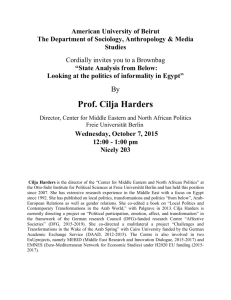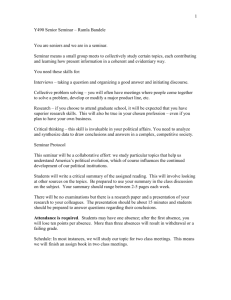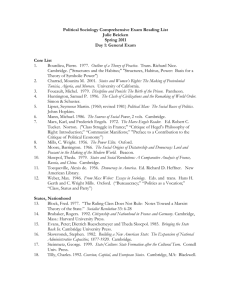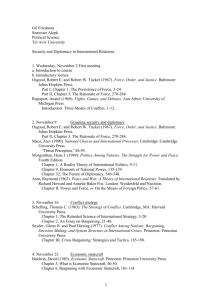MIDDLE EAST SPECIAL FIELD: READING LIST
advertisement
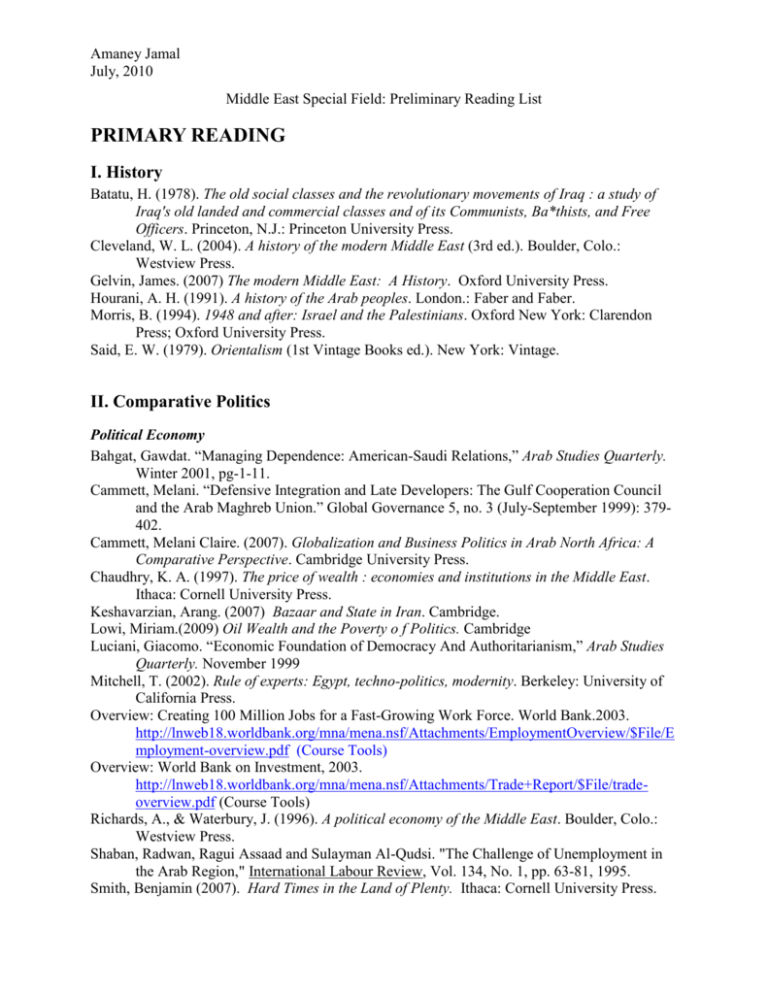
Amaney Jamal July, 2010 Middle East Special Field: Preliminary Reading List PRIMARY READING I. History Batatu, H. (1978). The old social classes and the revolutionary movements of Iraq : a study of Iraq's old landed and commercial classes and of its Communists, Ba*thists, and Free Officers. Princeton, N.J.: Princeton University Press. Cleveland, W. L. (2004). A history of the modern Middle East (3rd ed.). Boulder, Colo.: Westview Press. Gelvin, James. (2007) The modern Middle East: A History. Oxford University Press. Hourani, A. H. (1991). A history of the Arab peoples. London.: Faber and Faber. Morris, B. (1994). 1948 and after: Israel and the Palestinians. Oxford New York: Clarendon Press; Oxford University Press. Said, E. W. (1979). Orientalism (1st Vintage Books ed.). New York: Vintage. II. Comparative Politics Political Economy Bahgat, Gawdat. “Managing Dependence: American-Saudi Relations,” Arab Studies Quarterly. Winter 2001, pg-1-11. Cammett, Melani. “Defensive Integration and Late Developers: The Gulf Cooperation Council and the Arab Maghreb Union.” Global Governance 5, no. 3 (July-September 1999): 379402. Cammett, Melani Claire. (2007). Globalization and Business Politics in Arab North Africa: A Comparative Perspective. Cambridge University Press. Chaudhry, K. A. (1997). The price of wealth : economies and institutions in the Middle East. Ithaca: Cornell University Press. Keshavarzian, Arang. (2007) Bazaar and State in Iran. Cambridge. Lowi, Miriam.(2009) Oil Wealth and the Poverty o f Politics. Cambridge Luciani, Giacomo. “Economic Foundation of Democracy And Authoritarianism,” Arab Studies Quarterly. November 1999 Mitchell, T. (2002). Rule of experts: Egypt, techno-politics, modernity. Berkeley: University of California Press. Overview: Creating 100 Million Jobs for a Fast-Growing Work Force. World Bank.2003. http://lnweb18.worldbank.org/mna/mena.nsf/Attachments/EmploymentOverview/$File/E mployment-overview.pdf (Course Tools) Overview: World Bank on Investment, 2003. http://lnweb18.worldbank.org/mna/mena.nsf/Attachments/Trade+Report/$File/tradeoverview.pdf (Course Tools) Richards, A., & Waterbury, J. (1996). A political economy of the Middle East. Boulder, Colo.: Westview Press. Shaban, Radwan, Ragui Assaad and Sulayman Al-Qudsi. "The Challenge of Unemployment in the Arab Region," International Labour Review, Vol. 134, No. 1, pp. 63-81, 1995. Smith, Benjamin (2007). Hard Times in the Land of Plenty. Ithaca: Cornell University Press. Smith, Benjamin. “Oil Wealth and Regime Survival in the Developing World,” American Journal of Political Science, vol. 48, no. 2, pp. 232-246, Apr 2004 Valentine M. Moghadam, “Population Growth, Urbanization, and the Challenges of Unemployment,” Understanding the Contemporary Middle East, ed. Deborah Gerner, (Boulder: Lynne Reinner Publishers, 2004): Waldner, David (1999). State-Building and Late Development. Cornell University Press. World Bank. Better Governance for Development in the Middle East State Formation Anderson, L. (1986). The state and social transformation in Tunisia and Libya, 1830-1980. Princeton, N.J.: Princeton University Press. Anderson, Lisa. (1987). "The State in the Middle East and North Africa," Comparative Politics 20:1 (October): 1-18. Ayubi, N. N. M. (1995). Over-stating the Arab state: politics and society in the Middle East. London ; New York: I.B. Tauris. Beblawi, Hazem and Giacomo Luciani. (1987). The Rentier State. Croom Helm. Ghassan Salame (ed) The Foundations of the Arab State. Mitchell, T. (1991). The Limits of the State: Beyond Statist Approaches and Their Critics. The American Political Science Review, 85(1), 77-96. Owen, R. (2004). State, power and politics in the making of the modern Middle East (3rd ed.). New York: Routledge. Political Regimes, Change and Stability Anderson, L. (1999). Transitions to democracy. New York: Columbia University Press. Anderson, Lisa. “Absolutism and the Resilience of Monarchy in the Middle East,” Political Science Quarterly. Spring 1991. Bellin, Eva. “The Robustness of Authoritarianism in the Middle East: A Comparative Perspective,” Comparative Politics, vol. 36, no. 2, pp. 139-157. Jan, 2004. (e-reserves) Brownlee, J. (2007). Authoritarianism in an age of democratization. Cambridge ; New York: Cambridge University Press. Brumberg, Daniel. (2003). “Liberalization versus Democracy: Understanding Arab Political Reform,” Middle East Working Paper Series, Carnegie Endowment for International Peace, No. 37. Available at http://www.ceip.org/files/pdf/wp37.pdf. Brumberg, Daniel. (2001). "Dissonant politics in Iran and Indonesia," Political Science Quarterly 116:3 (Fall): 381-412. Herb, M. (1999). All in the family: absolutism, revolution, and democracy in the Middle Eastern monarchies. Albany: State University of New York Press. Herb, Michael. “Princes and Parliaments in the Arab World,” The Middle East Journal, vol. 58, no. 3, pp. 367-384, summer 2004 Hudson, M. C. (1977). Arab politics: the search for legitimacy. New Haven: Yale University Press. Lucas, Russell. “Monarchical Authoritarianism: Survival and Political Liberalization in a Middle Eastern Regime Type,” International Journal of Middle East Studies, vol. 36, no. 1, pp. 103-119, Feb 2004 Parsa, Misagh. (1989). Social Origins of the Iranian Revolution. Rutgers University Press. 2 Pripstein Posusney, Marsha and Michele Angrist Penner (2005). Authoritarianism in The Middle East: Regimes and Resistance. Lynne Reiner. Schlumberger, Oliver (Ed.) (2007) Debating Arab Authoritarianism. Stanford University Press. Stepan, Alfred with Graeme B. Robertson. (2003). “An ‘Arab’ More Than a ‘Muslim’ Democracy Gap,” Journal of Democracy 14:3 (July): 30-44. Zakaria, Fareed. (2003). The Future of Freedom: Illiberal Democracy at Home and Abroad. New York: W.W. Norton, Chapter 4: “The Islamic Exception,” pp. 119-160. Political Participation Clark, J. A. (2004). Islam, charity, and activism : middle-class networks and social welfare in Egypt, Jordan, and Yemen. Bloomington, Ind.: Indiana University Press. Jamal, A. A. (2007). Barriers to Democracy: The Other Side of Social Capital in Palestine and the Arab World: Princeton University Press. Korany, Bahgat, Paul Noble, and Rex Brynen. (1998). Political Liberalization and Democratization in the Arab World: Comparative Experiences. Lynne Rienner. Lust-Okar and Zerhouni (Eds) (2008), Political Participation in the Middle East. Boulder: Lynne Rienner. Singerman, Diane. (1995) Avenues of Participation. Princeton University Press. Political Institutions Angrist, Michele Penner. Party Building in the Modern Middle East. Angrist, Michele Penner. (2004). “Party Systems and Regime Formation in the Modern Middle East: Explaining Turkish Exceptionalism” Comparative Politics, Vol. 36, no. 2, January. Baaklani, Springborg and Denouex….volume on Parliamentary politics Baktiari, Bahman. (1996). Parliamentary Politics in revolutionary Iran. University Press of Florida. Brown, Nathan. (2001) Constitutions in a Non-Constitutional World. SUNY Press. Lust-Okar, E. (2005). Structuring conflict in the Arab world: incumbents, opponents, and institutions. Cambridge ; New York: Cambridge University Press. Lust-Okar, Ellen and Amaney Ahmad Jamal. (2002). "Rulers and rules: reassessing the influence of regime type on electoral law formation." Comparative Political Studies 35:3 (April): 337-67. Moustafa, Tamir (2007). The Struggle for Constitutional Power: Law, Politics and Economic Development in Egypt. Cambridge: Cambridge University Press. Rubin, Barry, and Metin Heper. (2002). Political Parties in Turkey. Frank Cass. Political Culture Davis, E. (2005). Memories of state: politics, history, and collective identity in modern Iraq. Berkeley: University of California Press. Dodge, Toby. (2003). Inventing Iraq: the failure of nation-building and a history denied. Columbia University Press. Makiya, Kanan and Samir al-Khalil. (1998). Republic of Fear: The Politics of Modern Iraq. University of California Press. Mitchell, T. (1988). Colonising Egypt. Cambridge: Cambridge University Press. 3 Pappé, I. (2004). A history of modern Palestine: one land, two peoples. Cambridge, UK ; New York: Cambridge University Press. Patai, R. (1976). The Arab mind. New York: Scribner. Sharabi, H. (1992). Neopatriarchy: a theory of distorted change in Arab society. Oxford University Press. Wedeen, L. (1999). Ambiguities of domination : politics, rhetoric, and symbols in contemporary Syria. Chicago: University of Chicago Press. Wedeen, L. (2003). Conceptualizing Culture: Possibilities for Political Science. American Political Science Review, 96(04), 713-728. Political Elites/Leadership Clancy-Smith, Julia. (1994). Rebel and Saint: Muslim Notables, Populist Protest, Colonial Encounters (Algeria and Tunisia, 1800-1904). University of California Press. Hammoudi, Abdellah. (1997). Master and Disciple: The Cultural Foundations of Moroccan Authoritarianism. University of Chicago Press. Moslem, Mehdi. (2002). Factional Politics in Post-Khomeini Iran. Syracuse University Press. Perthes, Volker (Ed.) (2004) Arab Elites: Negotiating the Politics of Change. Lynne Rienner. Seale, P., & McConville, M. (1988). Asad of Syria : the struggle for the Middle East. London: I.B. Taurus. Waterbury, J. (1970). The commander of the faithful: the Moroccan political elite --a study in segmented politics. London: Weidenfeld & Nicolson. Political Ideology Adeed Dawisha: Arab Nationalism. Ajami, F. (1992). The Arab predicament : Arab political thought and practice since 1967 (Updated ed.). Cambridge ; New York: Cambridge University Press. Al-Rasheed, M. (2006). Contesting the Saudi State: Islamic Voices from a New Generation: Cambridge University Press. Hourani, A. H. (1983). Arabic thought in the liberal age, 1798-1939. Cambridge; New York: Cambridge University Press. Kepel, G. (2002). Jihad : the trail of political Islam. Cambridge, Mass.: Belknap Press of Harvard University Press. Khalidi, R. (1991). The origins of Arab nationalism. New York: Columbia University Press. Maudoodi, S. A. A., & Ahmad, K. Towards understanding Islam. Islamic Teaching Center. Nasr, S. V. R. (1994). The vanguard of the Islamic revolution : the Jama*at-i Islami of Pakistan. Berkeley: University of California Press. Osama bin Laden, “The Winds of Faith” and “Terror for Terror,” taken from Messages to the World: The Statements of Osama bin Laden, ed. Bruce Lawrence, trans. James Howarth, (London: Verso, 2005). Qutb, S. (2000). Milestones. New Delhi: Millat Book Centre. Richard W. Bulliet, The Case for Islamo-Christian Civilization (New York: Columbia University Press, 2004): 126-133. Roy, O. (1994). The failure of political Islam. Cambridge, Mass.: Harvard University Press. Roy, O. (2004). Globalized Islam : the search for a new ummah. New York; Paris: Columbia University Press. 4 R. Stephen Humphreys, Between Memory and desire: The Middle East in a Troubled Age (Berkeley: University of California Press, 2005), Sayyid Qutb, “Corruption of the Modern World,” in The Middle East and Islamic World Reader, ed. by Marvin Gettleman and Stuart Schaar. (New York: Grove Press, 2003), p. 303- 306. Schwedler, Jillian. 2006. Faith in Moderation. Cambridge University Press. Tibi, B. (1997). Arab nationalism : between Islam and the nation-state (3rd ed.). London New York: Macmillan; St. Martin's Press. Wickham, C. R. (2003). Mobilizing Islam : religion, activism, and political change in Egypt. New York: Columbia University Press. Wiktorowicz, Q. (2004). Islamic activism : a social movement theory approach. Bloomington: Indiana University Press. Gender Dynamics Ahmed, L. (1992). Women and gender in Islam : historical roots of a modern debate. New Haven: Yale University Press. Barlas, Asma. Believing Women in Islam: Unreading Patriarchal Interpretations of the Quran. Texas University Press, 2002. Brand, Laurie. (1998) Women, the State, and Political Liberalization. Columbia. Charrad, Mounira. (2001). States and Women’s Rights. U-Texas. Daniello Donno and Bruce Russett. “Islam, Authoritarianism and Female Empowerment: What are the Linkages? Unpublished manuscript. http://www.yale.edu/unsy/brussett/Islam_WP.pdf Ingelhart, Ronald and Pippa Norris (2003) Rising Tide. Cambridge Mahmood, S. (2005). Politics of piety : the Islamic revival and the feminist subject. Princeton, NJ: Princeton University Press. Martina Ottaway. “Women’s Rights and Democracy in the Arab World,” Carnegie Foundation, 2004. http://www.ceip.org/files/pdf/CarnegiePaper42.pdf Mernissi, F. (1987). Beyond the veil : male-female dynamics in modern Muslim society (Rev. ed.). Bloomington: Indiana University Press. Unspeakable Love: Gay and Lesbian Life in the Middle East.? Brian Whitaker Ross, Michael. “Oil, Islam and Women.” APSR. 2008. Sedghi, Hamidah (2007). Women and Politics in Iran: Veiling, Unveiling, and Reveiling. Cambridge University Press. Steven Fish. “Islam and Authoritarianism,” World Politics. 2002. (e-journals) http://muse.jhu.edu/demo/world_politics/v055/55.1fish.html Political Islam Ahmed, Akbar. Journey into Islam: The Crisis of Globalization. 2007 Ali, Tariq (2002). The Clash of Fundamentalisms: Crusades, Jihads and Modernity. London: Verso. Baker, Raymond William (2003). Islam without Fear: Egypt and the New Islamists. Cambridge: Harvard University Press. Bayat, Asef (2007). Making Islam Democratic Stanford. Clark, Janine (2004), Islam, Charity and Activism: Middle-Class Networks and Social Welfare in Egypt, Jordan and Yemen. Indiana University Press. 5 Deeb, Lara. Hizballah: A Primer. Middle East Report Online July 31, 2006. http://www.merip.org/mero/mero073106.html Feldman, Noah (2008). The Fall and Rise of the Islamic State. Princeton: Princeton University Press. Hefner, Robert (Ed.) (2005). Remaking Muslim Politics: Pluralism, Contestation, Democratization. Princeton: Princeton University Press. John Esposito, Azim Nanji, and Vail Nasr. Of Burkhas and Ballots. 2003. Kepel, Gilles. (2002). Jihad: The Trail of Political Islam. Trans. By Anthony F. Roberts. Harvard University Press. Rougier, Bernard. Everyday Jihad. Cambridge: Harvard. 2007 Sayari, Sabri and Yilmaz Esmer, eds. (2002). Politics, Parties, and Elections in Turkey. Lynne Reiner. The Shia Revival: How Conflicts within Islam Will Shape the Future.? Vali Nasr. Wiktorowicz, Q. (2001). The management of Islamic activism : Salafis, the Muslim Brotherhood, and state power in Jordan. Albany, NY: State University of New York Press. Wiktorowicz, Quintan (Ed). (2004), Islamic activism: a social movement theory approach. Indiana University Press. III. International Relations Conflict and Peace Caton, S. C. (2005). Yemen chronicle: an anthropology of war and mediation (1st ed.). New York: Hill and Wang, a division of Farrar, Straus and Giroux. Halliday, F. (2005). The Middle East in international relations: power, politics and ideology. Cambridge, UK ; New York: Cambridge. Power and Leadership in International Bargaining: The Path to the Camp David Accords.? Shibley Telhami. Shlaim, A. (2000). The iron wall: Israel and the Arab world (1st ed.). New York: W.W. Norton. Tessler, M. A. (1994). A History of the Israeli-Palestinian conflict. Bloomington ; Indianapolis: Indiana University Press. The Middle East and the United States: A Historical and Political Reassessment. (ed) Lesch, David. Changing International/Regional Relations Anderson, Lisa. “Peace and Democracy in the Middle East: The Constraints of Soft Budgets,” Journal of International Affairs. Summer 1985 BBC: “US Blocking Arab Freedom Report,” December, 23, 2004. http://news.bbc.co.uk/2/hi/americas/4121261.stm Bronson, Rachel. (2006). Thicker Than Oil: America's Uneasy Partnership with Saudi Arabia. Oxford University Press. Dialogues in Arab Politics: Negotiations in Regional Order.? Michael N. Barnett. 6 Ehteshami, Anoushiravan (2007). Globalization and geopolitics in the Middle East: Old Games, New Rules. Routelege. Gerges, Fawaz (2005). The Far Enemy: Why Jihad went global. Cambridge: Cambridge University Press. Hurd, Elizabeth Shakman (2008). The Politics of Secularism in International Relations. Princeton: Princeton University Press. McAlister, Melani. Epic Encounters: Culture, Media and US interests in the Middle East, 19452000.University of California Press, 2001. Oren, M. (2002). Six days of war : June 1967 and the making of the modern Middle East. Oxford; New York: Oxford University Press. Timothy Mitchell. “McJihad: Islam and the US Global Order,” Social Text. 2002. Domestic Politics-International Relations Jamal, Amaney. “The Prospects of Democracy and Economic Reform in the Arab World,” Perspectives on Politics. Vol. 3, no. 3. September 2005. Larry Diamond. Foreign Affairs, Sept/Oct 2004. Lynch, M. (1999). State interests and public spheres: the international politics of Jordan's identity. New York: Columbia University Press. Lynch, Marc. (2006) Voices of the New Arab Public. Columbia University Press. Roberts, H. (2003). The battlefield Algeria, 1988-2002 : studies in a broken polity. London ; New York: Verso. Sayigh, Y. (1997). Armed struggle and the search for state: the Palestinian national movement, 1949-1993. New York: Clarendon Press. Political Economy Brand, Laurie. Jordan’s Inter-Arab Relations: The Political Economy of Alliance Making Henry, Clement and Robert Springborg (2001). Globalization and the politics of development in the Middle East. Cambridge: Cambridge University Press. Martina Ottaway. Promoting Democracy in the Middle East: Problems with US Credibility, 2003. http://www.ceip.org/files/pdf/wp35.pdf Vitalis, Robert. (2006). America's Kingdom: Mythmaking on the Saudi Oil Frontier. Stanford University Press. To be Placed Arab Human Development Reports Hootan Shambayati, “The Rentier State, Interest Groups, and the Paradox of Autonomy: State and Business in Turkey and Iran” Comparative Politics 26 (April 1994), Langhor, Vickie. “Of Islamists and Ballot Boxes: Rethinking the Relationship between Islamists and Electoral Politics,” IJMES. November 2001, pgs. 591-610 Pripstein Posusney, Marsha. “Multi-Party Elections in the Arab World: Institutional Engineering and Oppositional Strategies,” Studies in Comparative and International Development, Vol. 36, no. 4, winter 2002, pgs. 34-62. Robinson, Glenn. “Defensive Democratization in Jordan,” IJMES. August, 1998, pgs. 387-410. Ross, Michael. “Does Oil Hinder Democracy?” World Politics. April 2001 7 Tessler, Mark, “Islam and Democracy in the Middle East: The Impact of Religious Orientations on Attitudes toward Democracy in Four Arab Countries,” Comparative Politics, April, 2002. SECONDARY READING (OPTIONAL) Abdo, Geneive and Jonathan Lyons. (2003). Answering only to God: faith and freedom in twenty-first-century Iran. Henry Holt. Al-Rasheed, M. (2002). A history of Saudi Arabia. Cambridge, UK ; New York: Cambridge University Press. Ansari, A. i. (2003). Modern Iran since 1921: the Pahlavis and after. London ; New York: Longman. Arjomand, Said. (1988). The Turban for the Crown. Brumberg, Daniel. (2003). Reinventing Khomeini: The struggle for reform in Iran. University of Chicago Press. Fromkin, D. (2001). A peace to end all peace: the fall of the Ottoman Empire and the creation of the modern Middle East (1st Owl Books ed.). New York: H. Holt. Halliday, F. (1995). Islam and the myth of confrontation: religion and politics in the Middle East. London ; New York: I.B. Tauris. Hodgson, M. G. S. (1974). The venture of Islam: conscience and history in a world civilization. Chicago: University of Chicago Press. Horne, A. (2002). A savage war of peace: Algeria 1954-1962: Pan Books. Ibn, K. u., & Rosenthal, F. (1967). The Muqaddimah : an introduction to history (2d ed.). Princeton, N.J.: Princeton University Press. Keddie, N. R., Richard, Y., & Keddie, N. R. (2003). Modern Iran : roots and results of revolution. New Haven, CT: Yale University Press. Kepel, G. (2004). The war for Muslim minds: Islam and the West. Cambridge, Mass.: Belknap Press. Kurzman, C. (2004). The unthinkable revolution in Iran. Cambridge, Mass.: Harvard University Press. Lewis, B. (2002). The emergence of modern Turkey / Bernard Lewis (3rd ed.). New York: Oxford University Press. Marr, P. (1985). The modern history of Iraq. Boulder: London: Westview; Longman. Mecham, R. Quinn. (2004). "From the ashes of virtue, a promise of light: the transformation of political Islam in Turkey." Third World Quarterly 25:2 (April): 339-358. Mitchell, R. P. (1993). The Society of the Muslim Brothers. New York: Oxford University Press. Morris, B. (1997). Israel's border wars, 1949-1956 : Arab infiltration, Israeli retaliation, and the countdown to the Suez War. Oxford Mottahedeh, Roy (1986). The Mantle of the Prophet: Religion and Politics in Iran. London: Chatto and Windus. Pollack, K. M. (2002). Arabs at war: military effectiveness, 1948-1991. Lincoln, NE: University of Nebraska Press. Qaradawi, Y. u. (1992). Priorities of the Islamic movement in the coming phase (1st ed.). Cairo: al-Dar. Qutb, S. (1970). Social justice in Islam. New York,: Octagon Books. Tibi, B. (1993). Conflict and war in the Middle East, 1967-91 : regional dynamic and the superpowers. Houndmills: Macmillan Press. 8 Tripp, C. (2007). A history of Iraq (3rd ed.). Cambridge ; New York: Cambridge University Press. Vatikiotis, P. J. (1978). Nasser and his generation. London: C. Helm. Waterbury, J. (1983). The Egypt of Nasser and Sadat: the political economy of two regimes. Princeton, N.J.: Princeton University Press. Woodward, D. R. (2006). Hell in the Holy Land : World War I in the Middle East. Lexington, Ky.: The University Press of Kentucky. Zubaida, S. (1989). Islam, the people and the state : essays on political ideas and movements in the Middle East. London ; New York: Routledge. 9 International Relations Important Recent History -Yehosua Porath, In Search of Arab Unity, 1930-1945 Avi Shlaim, Collusion Across the Jordan Patrick Seale, The Struggle for Syria Malcolm Kerr, The Arab Cold War Fawaz Gerges, The Superpowers and the Middle East: Regional and International Politics, 1955-1967 Benny Morris, Righteous Victims Bruce Kuniholm, The Origins of the Cold War in the Near East America and... Michael Oren, Power, Faith and Fantasy: America in the Middle East James Bill, The Eagle and the Lion Robert Vitalis, America's Kingdom William Quandt, Peace Process Lawrence Freedman, A Choice of Enemies: America Confronts the Middle East George Packer, The Assassins' Gate Thomas Ricks, Fiasco A few country books and other stuff... Nadav Safran, Saudi Arabia: Ceaseless Quest for Security Nadav Safran, Israel: The Embattled Ally Malik Mufti, Sovereign Creations: Pan-Arabism and Political Order in Syria and Iraq R. K. Ramazani, Revolutionary Iran: Challenge and Response in the Middle East Fouad Ajami, The Arab Predicament Islam and IR... Jacob Landau, The Politics of Pan-Islam James Piscatori, Islam in a World of Nation States Daniel Benjamin and Steven Simon, The Age of Sacred Terror Lawrence Wright, The Looming Tower Some efforts at theorizing... Stephen Walt, The Origins of Alliances L. Carl Brown, International Politics and the Middle East Michael Barnett, Dialogues in Arab Politics Fred Halliday, The Middle East in International Relations Fred Lawson, Constructing International Relations in the Arab World Ray Hinnebusch, The International Politics of the Middle East 10 11


